Tornado hits Joplin’s small Jewish community
 Two Jewish brothers who were reported missing in the wake of a deadly tornado in Joplin, Mo., are safe. Joplin is located approximately 140 miles from Kansas City.
Two Jewish brothers who were reported missing in the wake of a deadly tornado in Joplin, Mo., are safe. Joplin is located approximately 140 miles from Kansas City.
JTA reports all the members of the small Jewish community in Joplin have now been accounted for, but many lost their homes and possessions in the tornado.
The Jewish Federation of St. Louis said that at least four Jewish families have lost everything and are living in shelters.
Approximately 50 Jews live in Joplin, according to the St. Louis federation, in a population of some 50,000.
The United Hebrew Congregation, the only synagogue in Joplin, which has approximately 40 member families, was unharmed by the tornado. Rabbi Jacques Cukierkorn of Temple Israel, who served as a student rabbi at the Reform congregation for the 1991-92 school year, spent most of Monday and Tuesday on the telephone reaching out to friends in the Joplin area.
Rabbi Yehuda Weg, the Tulsa-based director of Chabad-Lubavitch of Oklahoma, told Chabad.org Tuesday that several Jewish-owned homes were “totally flattened.” He had driven to Joplin the previous night with a list of Jewish community members in need and a car full of supplies, joining volunteers from the American Red Cross and local disaster agencies, according to Chabad.org.
The United Hebrew Congregation of Joplin, a Reform synagogue, was not damaged. The synagogue reportedly has existed in the city since at least 1919.
As of midafternoon Wednesday, May 25, the killer tornado, which is being called the second-deadliest tornado in U.S. history, had claimed 125 lives in Joplin. Hundreds are still missing. The tornado cut through Joplin
Sunday evening, one of several tornadoes that hit the Midwest over the weekend due to a system of severe thunderstorms that also have caused massive flooding.
The search and rescue efforts were still in full force Wednesday afternoon, and the situation regarding the type of donations and help wanted continued to evolve.
The Jewish Federation of Greater Kansas City began taking action early Monday morning to help the victims of this tornado as well as the one that destroyed areas of Reading, Kan., on Saturday, May 21. On Wednesday, in Joplin’s case, monetary donations were still considered to be the highest priority. Federation has established the Kansas-Missouri Tornado Relief Fund. It can be accessed at www.jewishkansascity.org, or by going directly to the donation page at www.jewishkansascity.org/tornadorelief2011.aspx. People can also make a donation over the phone by calling (913) 327-8100.
The Union for Reform Judaism has also established a disaster relief fund. Donations can be directed to the general URJ relief fund or can specifically be earmarked to address the needs in Joplin (http://urj.org/socialaction/issues/relief/).
The United Hebrew Congregation is being served by student rabbi Ariel Boxman. Boxman is beginning her second year of serving the congregation as she enters her fourth year at HUC-JIR.
Boxman was expected to fly to Joplin on Wednesday and stay there until Monday. She was already scheduled to be there this coming Shabbat.
Rabbi Cukierkorn had initially planned to go to Joplin on Monday, but his contacts there advised him to stay in Kansas City and come when things settled a bit. He is planning a trip to Joplin on Monday.
“I was told Monday it is almost impossible to get around town because there are live electric cables and there was the potential for more flooding,” Rabbi Cukierkorn said.
The Kansas City rabbi continues to stay in contact with members of the Joplin Jewish community. He plans to deliver donations, and anything else they ask for when he travels there next week.
Boxman is planning to blog about relief efforts in the Joplin Jewish community as well as offering her observations related to her experience there. Look for her posts on the Reform Movement blog at http://blogs.rj.org/reform/.
Jewish Federation staffers, including Todd L. Stettner, executive vice president and CEO, worked to keep area congregations and Jewish organizations up-to-date on how they all could work together to provide Kansas City’s Jewish response for tornado victims. Over the past few days Federation began working closely with Heart to Heart International, a local medical relief organization, and Salvation Army to support immediate medical assistance, as well as long-term recovery efforts.
“Both of our partner organizations request financial support at this time, in order to more quickly and effectively meet the needs of tornado victims,” Stettner said.
On Tuesday the Jewish Federation’s board of directors took an emergency vote to immediately allocate $5,000 to the current medical relief and the ongoing recovery assistance relief.
“This was a no-brainer for us,” said Jewish Federation Board President Bill Carr. “With one of two hospitals in Joplin wiped out, and the fact that they are our neighbors, it was an easy decision for us to act in our continued role to mobilize the community and provide a local ‘Jewish’ response to the challenges they face now and in the future as they rebuild their lives.”
Carr said so far Federation has gotten a great response to its Kansas-Missouri Tornado Relief Fund, “over and above what the board voted to allocate.”
“I personally want to thank all of the individuals in Kansas City who have already stepped up to help our neighbors, and I invite all who are concerned to help as recovery efforts progress,” he said
Carr said the Federation will continue to work to keep Kansas Citians informed about hands-on volunteer opportunities to assist. At this time Federation is communicating those opportunities to the local congregations, agencies and organizations. Federation officials suggest members of the Jewish community to contact their congregations, local Jewish organizations or go to www.jewishkansascity.org to find out what the most urgent needs are and where help is most needed.
Blood is also needed. Visit www.savealifenow.org, to find blood donation locations.



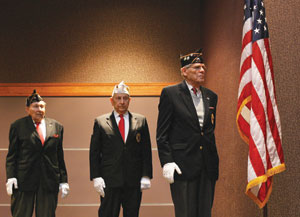 Many of us think of Memorial Day, which is Monday, May 30, as the official beginning of the summer season and a day off from work. But it is actually a day of remembrance for those who have died in our nation’s service. Those who never forget the real meaning of the holiday are member of the Jewish War Veterans Mo-Kan Post 605.
Many of us think of Memorial Day, which is Monday, May 30, as the official beginning of the summer season and a day off from work. But it is actually a day of remembrance for those who have died in our nation’s service. Those who never forget the real meaning of the holiday are member of the Jewish War Veterans Mo-Kan Post 605.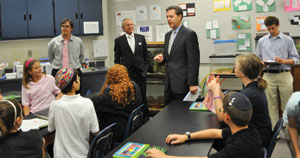 Kansas Governor Sam Brownback made his first-ever visit to the Hyman Brand Hebrew Academy Tuesday, May 24. Brownback entered the Jewish Community Center Social Hall to a rousing rendition of Hebrew songs by the fifth grade choir, directed by Devra Lerner.
Kansas Governor Sam Brownback made his first-ever visit to the Hyman Brand Hebrew Academy Tuesday, May 24. Brownback entered the Jewish Community Center Social Hall to a rousing rendition of Hebrew songs by the fifth grade choir, directed by Devra Lerner.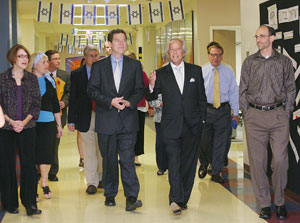 Brownback’s visit was also appreciated by Eric Kaseff, president of the HBHA board of trustees.
Brownback’s visit was also appreciated by Eric Kaseff, president of the HBHA board of trustees.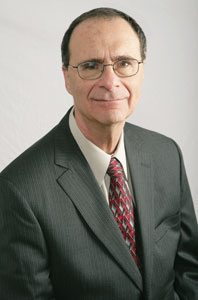 Shavuot commemorates the giving of the Torah at Sinai and celebrates the late spring harvest. One of the traditional ways to celebrate Shavuot is to stay up all night studying Torah. For more than 15 years the Kansas City Jewish community has been doing just that at an annual communitywide Shavuot program held at Kehilath Israel Synagogue and sponsored by the Rabbinical Association and area congregations. This year’s program will be held June 7. (For more details, see below.)
Shavuot commemorates the giving of the Torah at Sinai and celebrates the late spring harvest. One of the traditional ways to celebrate Shavuot is to stay up all night studying Torah. For more than 15 years the Kansas City Jewish community has been doing just that at an annual communitywide Shavuot program held at Kehilath Israel Synagogue and sponsored by the Rabbinical Association and area congregations. This year’s program will be held June 7. (For more details, see below.)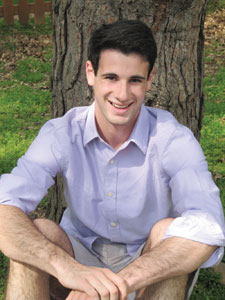 Motivated is the best word to describe Michael Bodker. This high achieving teen, who is co-president of Nordaunian AZA and president of Kansas City United Synagogue Youth, has energy to spare. He focuses this energy on Jewish causes and tzedakah.
Motivated is the best word to describe Michael Bodker. This high achieving teen, who is co-president of Nordaunian AZA and president of Kansas City United Synagogue Youth, has energy to spare. He focuses this energy on Jewish causes and tzedakah.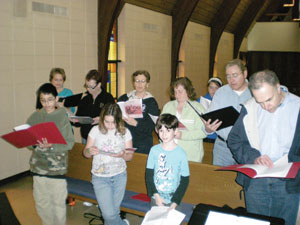 Mark Sunday, June 5, on your calendar for an event you won’t want to miss!
Mark Sunday, June 5, on your calendar for an event you won’t want to miss!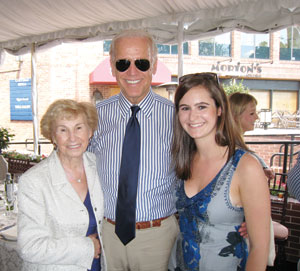 MEETING THE VP — Proud grandmother Adela Dagerman was in Washington, D.C., with her family last weekend to celebrate the graduation from Georgetown University of her granddaughter, Michelle Hammer, the daughter of Steve and Linda Hammer. The family gathered for lunch on Saturday afternoon at Café Milano, a Georgetown restaurant. Vice President Joe Biden was there also, celebrating his niece’s graduation. When Adela heard the veep was in the restaurant too, she took Michelle’s hand and led her off to meet the vice president, waltzing right past the secret service agents. Adela told the vice president that she was a survivor of Auschwitz, lost 72 members of her family during the Holocaust and wanted an invitation to the White House. He asked for her information, which she provided, and he said he would take care of it. She expects that invitation will arrive in the mail shortly!
MEETING THE VP — Proud grandmother Adela Dagerman was in Washington, D.C., with her family last weekend to celebrate the graduation from Georgetown University of her granddaughter, Michelle Hammer, the daughter of Steve and Linda Hammer. The family gathered for lunch on Saturday afternoon at Café Milano, a Georgetown restaurant. Vice President Joe Biden was there also, celebrating his niece’s graduation. When Adela heard the veep was in the restaurant too, she took Michelle’s hand and led her off to meet the vice president, waltzing right past the secret service agents. Adela told the vice president that she was a survivor of Auschwitz, lost 72 members of her family during the Holocaust and wanted an invitation to the White House. He asked for her information, which she provided, and he said he would take care of it. She expects that invitation will arrive in the mail shortly!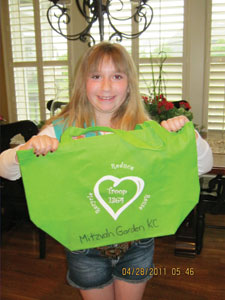
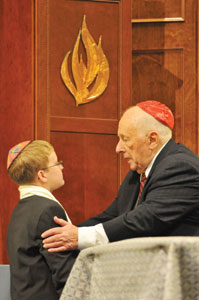 Cantor Paul Silbersher can give you several definitions of the word retire. Then he’ll tell you even though he’s officially retiring from Congregation Kol Ami as its spiritual leader, he probably won’t really retire at all. He’ll just take on another project.
Cantor Paul Silbersher can give you several definitions of the word retire. Then he’ll tell you even though he’s officially retiring from Congregation Kol Ami as its spiritual leader, he probably won’t really retire at all. He’ll just take on another project.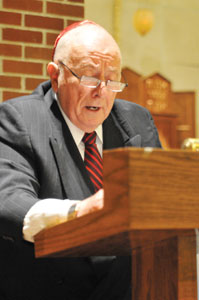 He came to B’nai Jehudah in 1979.
He came to B’nai Jehudah in 1979.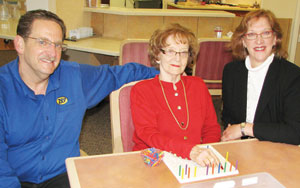 Good work is its own reward. But sometimes it can return many years later as an unexpected blessing, as Leslie Caplan has discovered.
Good work is its own reward. But sometimes it can return many years later as an unexpected blessing, as Leslie Caplan has discovered.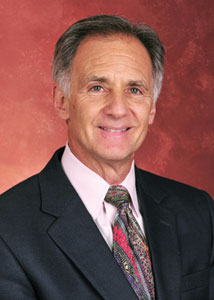 If you are a member of the Jewish Community Center you are keenly aware that the agency has undergone a thorough reorganization from the top down over the past few years. That reorganization resulted in making the agency more fiscally responsible as well as more appealing to members and prospective members. JCC members will celebrate those successes at its annual meeting Sunday, May 22, when it installs Gary Weinberg for a two-year term as president.
If you are a member of the Jewish Community Center you are keenly aware that the agency has undergone a thorough reorganization from the top down over the past few years. That reorganization resulted in making the agency more fiscally responsible as well as more appealing to members and prospective members. JCC members will celebrate those successes at its annual meeting Sunday, May 22, when it installs Gary Weinberg for a two-year term as president.